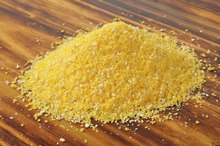Ferrous Sulfate & Birth Control Pills
Iron deficiency frequently occurs in women of childbearing age. Women of reproductive age have higher iron requirements than post-menopausal women or men, because they lose blood every month during their menstrual periods. Your medical practitioner may prescribe ferrous sulfate, the most commonly prescribed type of iron supplement according to the University of Maryland Medical Center, if you have low iron levels. Taking birth control pills, also known as oral contraceptives, can reduce your need for iron in several ways.
Decreased Bleeding
Birth control pills have the positive side effect of decreasing menstrual bleeding in most women. The uterine lining does not build up to the thick levels seen when you produce natural estrogen, so there is less to shed during menstruation. When you don’t take oral contraceptives, your lining thickens under the influence of estrogen so that a developing embryo will have enough of a blood supply to grow. Artificial forms of estrogen don’t thicken the lining as much, so you experience less menstrual bleeding. Losing less blood means less of a chance of developing iron deficiency.
- Birth control pills have the positive side effect of decreasing menstrual bleeding in most women.
- Artificial forms of estrogen don’t thicken the lining as much, so you experience less menstrual bleeding.
Iron in Oral Contraceptives
How Long Does Iron Stay in Your System?
Learn More
Some brands of oral contraceptives include iron in the form of ferrous sulfate or other iron supplements in the inactive pills, sometimes called "reminder" pills, you take. Many oral contraceptives stop the active hormones after three weeks and give “reminder” pills, which contain no hormones but keep you on a regular cycle of taking one pill daily. You may recognize oral contraceptives that contain iron because they use the chemical symbol for iron, Fe, in their name.
Iron Needs
Women of childbearing age normally need 18 mg of iron per day. Ferrous iron salts, which include ferrous sulfate, have the best absorption rate of iron supplements. When you’re taking oral contraceptives, however, you don’t need to take as much iron, according to Colorado State University Extension; 10.9 mg of iron per day will meet your needs when you’re on birth control pills 2.
Considerations
Iron Supplements & Levothyroxine
Learn More
Most but not all women experience less menstrual bleeding while taking oral contraceptives. If you still have heavy menstrual periods, you may still need to take an iron supplement. Ask your doctor about what dosage to take, especially if your birth control pills also contain iron, since your body does not excrete iron, which builds up in tissues and organs such as the liver. Overdoses of iron can cause liver disorders, diabetes and skin discoloration.
- Most but not all women experience less menstrual bleeding while taking oral contraceptives.
- Ask your doctor about what dosage to take, especially if your birth control pills also contain iron, since your body does not excrete iron, which builds up in tissues and organs such as the liver.
Related Articles
References
- eMedTV; Loestrin 24 Fe; Kristi Monson, Pharm.D.; August 2008
- American Congress of Obstetricians and Gynecologists: Birth Control Pills
- World Health Organization. Iron deficiency anemia; Assessment, prevention and control; A guide for program managers.
- Milman N, Jønsson L, Dyre P, Pedersen PL, Larsen LG. Ferrous bisglycinate 25 mg iron is as effective as ferrous sulfate 50 mg iron in the prophylaxis of iron deficiency and anemia during pregnancy in a randomized trial. J Perinat Med. 2014;42(2):197-206. doi:10.1515/jpm-2013-0153
- Duque X, Martinez H, Vilchis-Gil J, et al. Effect of supplementation with ferrous sulfate or iron bis-glycinate chelate on ferritin concentration in Mexican schoolchildren: A randomized controlled trial. Nutr J. 2014;13:71. doi:10.1186/1475-2891-13-71
- Fouad GT, Evans M, Sharma P, Baisley J, Crowley D, Guthrie N. A randomized, double-blind clinical study on the safety and tolerability of an iron multi-amino acid chelate preparation in premenopausal women. J Diet Suppl. 2013;10(1):17-28. doi:10.3109/19390211.2012.758217
- Franklin M, Rohse WG, Huerga JDL, Kemp CR. Chelate iron therapy. JAMA. 1958;166(14):1685–1693. doi:10.1001/jama.1958.02990140019004
- Rojas ML, Sánchez J, Villada Ó, Montoya L, Díaz A, Vargas C, Chica J, Herrera AM. Eficacia del hierro aminoquelado en comparación con el sulfato ferroso como fortificante de un complemento alimentario en preescolares con deficiencia de hierro, Medellín, 2011 [Effectiveness of iron amino acid chelate versus ferrous sulfate as part of a food complement in preschool children with iron deficiency, Medellín, 2011]. Biomedica. 2013;33(3):350-60. Spanish. doi:10.7705/biomedica.v33i3.775
- Drugs.com. Ferrous bisglycinate.
Writer Bio
A registered nurse with more than 25 years of experience in oncology, labor/delivery, neonatal intensive care, infertility and ophthalmology, Sharon Perkins has also coauthored and edited numerous health books for the Wiley "Dummies" series. Perkins also has extensive experience working in home health with medically fragile pediatric patients.









